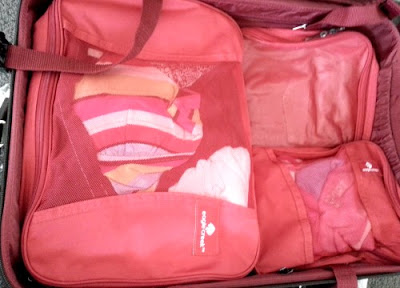Even if things are wonderful, we don't have to buy them.
Rather than buy something (for a one-time wear) she called up a few friends and borrowed a dress. She avoided a pointless purchase and hours in a shopping mall and instead spent time with her friend.
They sounded very helpful. For her next trip my wife, rather than buy another set, borrowed her sister's collection.
Shop-free - We didn't have to go to shopping to find them.
Enjoyable - The three of us caught up for a nice afternoon when my sister-in-law dropped the bags around.
Clutter-free - We returned them after the trip and don't have to store them. (We've got plenty enough items in our house already).
Reason 2 brought more joy to our day. Reasons 1 and 3 were about less. Less stress and less clutter. Even a handy travel item is clutter for the 50 weeks a year when you're not travelling.
It's easy to put a call out on social media. Couple friends of ours requested moving boxes. We had quite a few left over from our last move and were able to help out. I was so glad they didn't have to buy any.
For more about Streetbank, see my story The Keys to Happiness about our best borrowing experience. Also check out the Streetbank short films made by students to promote the idea.
The pregnancy dress
In the Minimalism movie, one woman tells a story of needing a nice-looking dress to wear to an event (while very pregnant). She had pregnancy clothes and nice clothes, but nothing that was both.Rather than buy something (for a one-time wear) she called up a few friends and borrowed a dress. She avoided a pointless purchase and hours in a shopping mall and instead spent time with her friend.
The travel pack
Amongst holiday stories, my sister-in-law mentioned her handy mesh travel bags. You can categorise and separate your items within your suitcase while still seeing what is where. No more rummaging through the whole suitcase to find one particular item.They sounded very helpful. For her next trip my wife, rather than buy another set, borrowed her sister's collection.
Triple benefits
There's three reasons this turned out to be a great move.Shop-free - We didn't have to go to shopping to find them.
Enjoyable - The three of us caught up for a nice afternoon when my sister-in-law dropped the bags around.
Clutter-free - We returned them after the trip and don't have to store them. (We've got plenty enough items in our house already).
Reason 2 brought more joy to our day. Reasons 1 and 3 were about less. Less stress and less clutter. Even a handy travel item is clutter for the 50 weeks a year when you're not travelling.
How can we do this more?
Family members are helpful. Sharing between friends can also be great. My wife has also borrowed a friend's dresses for weddings.It's easy to put a call out on social media. Couple friends of ours requested moving boxes. We had quite a few left over from our last move and were able to help out. I was so glad they didn't have to buy any.
When good neighbours become good friends
Taking it a step further, Streetbank is a site that helps neighbours share with each other. I've listed a tennis racquet, a basketball, DVDs, and tools. People can use these items when they need without having to buy their own.For more about Streetbank, see my story The Keys to Happiness about our best borrowing experience. Also check out the Streetbank short films made by students to promote the idea.



Comments
Post a Comment